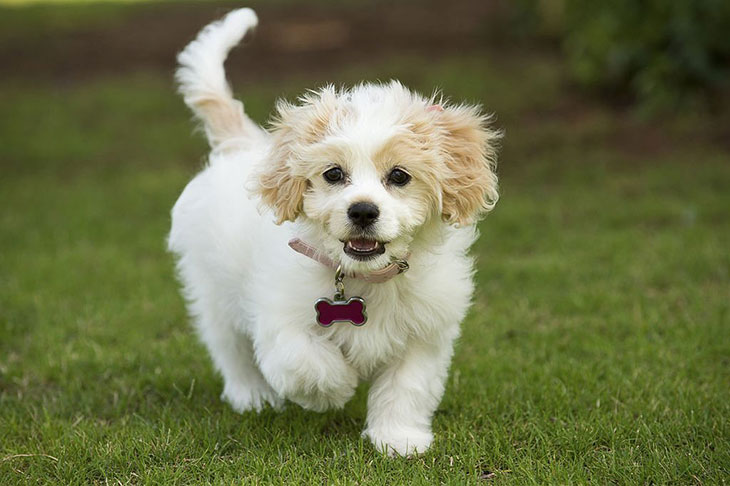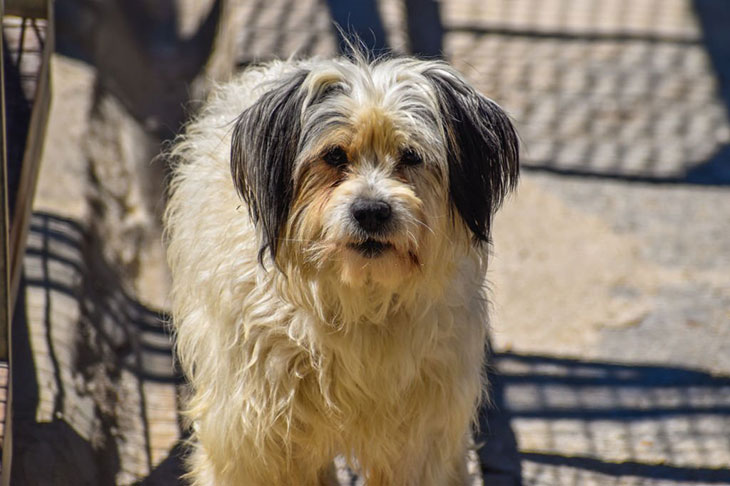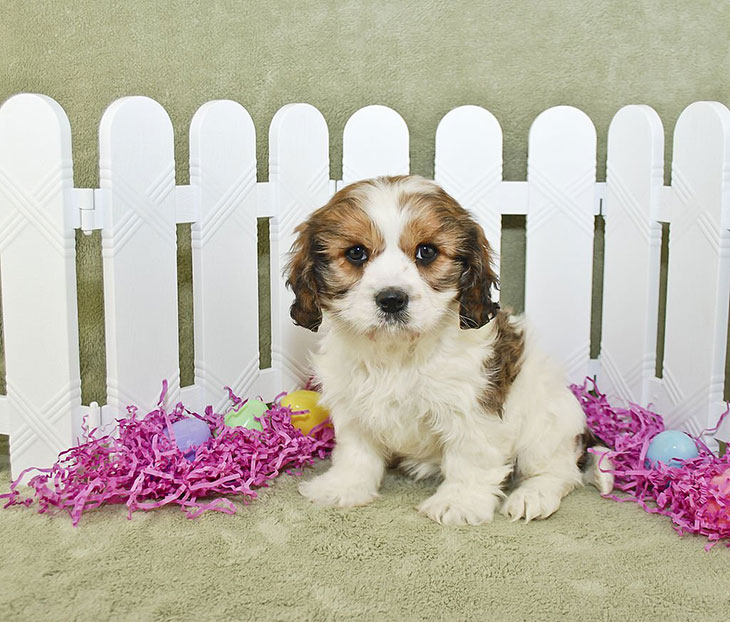Bringing home a Cavachon has been one of the latest trends among the pet lover community.
And that should not be a surprise: who could resist a second look at these fluffy, adorable creatures?
Yet, do not forget that responsibilities also tag along. How long do Cavachons live? And are there tips to increase the number? Keep scrolling through my guide to learn the answer.
How Long Do Cavachons Live?

Although history has witnessed dogs living longer than that, the most common range is about 10 to 15 years.
Cavachons are mixed breeds between Spaniel and the Bichon and less susceptible to health issues.
However, they still retain the same system weaknesses from their parents due to heredity.
What Are Cavachons?
“Cavachon” has always been the most popular name for these designer dogs.
However, dog parents from some regions are more familiar with other nicknames, such as “King Charles bichon,” “Cavalier bichon,” or “Cavashon.”
Overall, these monikers all point to the same fluff balls that crossbreed King Charles Cavalier Spaniel and Bichon Frise.
These pets are globally admired for their affectionate, friendly nature and adorable appearance.
Specifically, Cavachons have wavy/curly and soft coats in numerous colors – brown, black, apricot, and white being the most popular.
Better yet, these coats barely need any shedding, which makes Cavachon a great choice among people who are prone to pet allergies.
And compared to other dogs, Cavachons’ sociability and gentleness are unmatched: they are favored by large-sized families due to their friendliness with both small kids and other household pets.
These creatures adore human affection and companionship, enjoying all types of human family activities.
Some may mistake Cavachon breeds for Cavapoo – another hybrid, designer dog also praised for being a friendly light shedder.
Both have Cavalier King Charles spaniel as one of their parents – and not to mention, their names sound almost identical!
However, there is one major difference: the other parent of Cavachon is bichon frises, while Cavapoo’s is toy poodles.
Cavachon Life Expectancy
Grown Cavachons are generally much healthier than other dogs. As a result of the mix breed, they are much less vulnerable to common health issues often found in their purebred counterparts.
Unfortunately, that does not excuse these pets from hereditary health risks, which still have a major (negative) impact on Cavachon life span and well-being.
As such, their life expectancy stoops around 10 to 15 years.
Surpassing these numbers is not impossible, though, given proper care and upkeep. Several exceptional cases even graze the eighteen milestones!
Aside from the nature of their breeds, other individual and environmental factors also have a say in the matter. I will discuss them further in the next section.
Factors That Might Affect How Long Cavachons Live

Nutrition
Like humans, pets also need the best nutrition for optimal health maintenance.
And no, I am not just talking about regular feeding schedules (although they are also important). Owners must also ensure the treats are species-appropriate, high-quality, and fresh.
Cavachons receiving inadequate, poor nutrition during their development stages will likely encounter major health conditions, especially in the joints.
Likewise, overfed Cavachons are at similar health disadvantages: the extra weight likely goes with obesity problems, which lead to other health complications and eventually shorten their lifespans.
Note that aging dogs, young dogs, dogs with medical histories, and extremely active dogs do not share the same nutritional requirements.
Worse, some might have allergic reactions to certain food types, resulting in coat and skin problems.
Your best bet is to count on veterinary nutritionists for great diet advice.
However, remember that at the end of the day, you know the dog better than anyone else.
So if your Cavachon does not thrive well on the recommended diet, speak to the vet again to make corresponding changes.
Food and nutrients aside, freshwater supplies are also critical in keeping the Cavachons well-hydrated.
Exercises
No pets can survive long without appropriate and adequate exercise, even strong mixed breeds like Cavachons.
Some younger dogs need strenuous, everyday exercise to maintain good mental and physical health, though this sentiment does not apply to every Cavachon. For instance:
- Cavachons with hip dysplasia (passed down by their parents) will do better with much lighter exercise routines.
- Arthritic ones benefit more from swimming than walking – since the former puts less pressure on their joints.
- Older dogs become exhausted quickly from long, strenuous walks. Instead, they prefer easier, shorter, yet more frequent walking sessions.
Most of the time, Cavachons have no trouble adjusting to the exercises; they are sociable and friendly creatures, after all.
Still, suppose that they prefer to lie around instead of running and walking.
There are some tips to help them become more active – such as buying interactive chew toys or playing fetch. You can even teach them a few agility activities.
Even Cavachons with neurological problems, aging issues, or recovering from recent injuries/medical conditions can still engage in safe exercises.
Just confirm with your vet/canine physiotherapist whether certain exercise options are possible, and ask them to demonstrate if necessary.
Appropriate Health and Veterinary Care
Of course, no sane owners should exclude health care while bringing up their Cavachons; a small injury can grow much more serious if not addressed on time.
Even something as minor as a tick or flea infestation has been cited as the cause of death for many hybrid breeds of dogs!
Moreover, Cavachon care are not just limited to medical or veterinary maintenance. Cavachons will enjoy a much longer lifespan when regularly groomed and washed with the right cleanser.
Also, remember to remove foreign objects, loose fur, mats, or anything that may get lodged in the dog’s paws or skin.
Environmental Factors
Cavachons are much smaller than us humans (and even than other dogs).
That means even the smallest amount of toxins and pollutants – which are usually unlikely to affect us – can have a strong, negative impact on our pets.
To make matters worse, this mixed breed of Charles Spaniel and Bichon is within much closer vicinity to the soil and ground.
That means they usually use their noses to explore the air and tongues to groom themselves.
As such, they suffer higher risks of toxin absorption and ingestion; cases in point include de-icing products, insecticides, pesticides, and lawn fertilizers.
Dogs that spend most daylight time outdoors are even more vulnerable to extreme weather exposure (baking heat, hail, snow, heavy rains, etc.) than indoors.
Together, these stressors wear down the dogs’ immune systems and age them faster.
Emotional Connection and Mental Stimulation
No human can enjoy a fulfilled, healthy life without affection from our peers; the same goes with Cavachons!
Strong emotional bonds – whether with other household pets or their actual owners – relax the pets and make them much happier.
And do not take mental stimulation out of the picture; unbeknownst to some, lying around every day with nothing entertaining to do is also another type of stress for dogs.
Stimulate their minds and bodies with positive reinforcements, such as daily exercises and games (nose work, for instance).
Living A Good Life
Considering all the factors above, this one becomes quite obvious.
Family pets that are well-cared for, loved dearly by everyone, and suffer very little stress clearly have a much better lifespan than others.
That is credited to the extra serotonins produced from moments of excitement and happiness, which strengthens the dog’s overall well-being.
Common Cavachon Health Issues That You Should Pay Attention To

What health problems do Cavachons have? There are, unfortunately, more health concerns than you would think. Check them out:
Skin Problems
Itching is the most common tell-tale signal of skin problems in your Cavachons. Other issues one should pay attention to are hair loss, dandruff, skin sores, bumps, lumps, dry skin, redness, and rashes.
Ear Diseases
Dogs with saggy ears (like Spaniels) go down with ear infections – and since Charles Spaniel is one of the Cavachons’ parents, the latter likely suffers from the same issue due to heredity.
And genetics aside, environmental factors may also play a part, causing crusting, swelling, redness, itchiness, and pain in their ears.
Urinary Tract Infection (UTI)
UTI brings immense trouble for the dogs to pass their urine. Signals of UTI in designer puppies like Cavachons include:
- Drinking more water than usual
- Passing more urine than usual
- Losing bladder control
- Blood in the urine
- Strong urine smell (like asparagus, for example).
Vomiting
Although you do not have to drop by a vet every time the pet vomits, it’s not something you should ignore or play second-guessing, either.
Contact professional help immediately if the vomits occur with other issues such as lethargy or diarrhea – they might result from gastrointestinal blockage or poisoning.
Diarrhea
Diarrhea either occurs by itself or accompanies other symptoms (such as vomiting).
1 or 2 diarrhea episodes are not really considered emergencies and can be treated at home. Recurring diarrhea, on the other hand, needs emergency treatment and diagnosis.
Parasites
External and internal parasites will eventually happen at one point or another. Brace themselves for them – since they are inevitable.
Parasite symptoms vary depending on the parasite type, infestation severity, and where it resides. It would be best to seek vegetarians when anything unusual occurs.
Dental Cleaning Issues
Similar to humans, dental diseases are not uncommon for canines, a consequence of excessive plaque buildup. They usually manifest in:
- Difficulties in eating
- Bleeding teeth or gums
- Bad breath
- Loose teeth
Obesity
Just so you know, obesity is considered one of the most common dog diseases. Almost 30% of dogs (mixed breeds like Cavachons included) have become its victim!
Obesity is often caused by overfeeding, little exercise, genetic predisposition, and age, among others.
Arthritis
Needless to say, joint problems might severely restrict the canine’s mobility. Bring it to a clinic if you see at least one of the following indicators:
- The dog limps or slows down before/after walks
- Behavioral issues/changes (ex: lying down all day instead of being active)
- Chewing and licking on the tender areas
Poisoning
It is not easy to single out the definitive symptoms of poisoning since their sources are so diverse.
Cases in point are caffeine, onions, raisins, grapes, chocolates, human medications, pesticides, house & yard cleaning products, and even plants.
The signs range from level-1 drooling and vomiting to seizures and even coma.
To keep both you and your Cavachon from troubles, it would be best to double-check the dog’s food and its surroundings in the first place.
Eye Conditions
Although canine cataracts are more common in old-age dogs, this does not really apply to Cavachons. Even younger ones suffer from cataracts; some are even born with it.
The best solution is to turn to skilled ophthalmic veterinarians; they will surgically remove cataracts from the cavachon puppy’s eyes to restore its sight.
Heart Issues
Heart disease (or congestive heart failure) is something any Cavachon parent should look out for as well, especially if the dog has already been middle- or old-aged.
Signals of Cavachons’ heart failures include:
- Breathing difficulties or short breaths
- Exercise difficulty
- Fatigue
- Coughing
- Little to no appetite
- Fainting
Cushing Diseases
Too much hormone cortisol within the bloodstream is the usual formula for Cushing’s Disease, causing tumors in the adrenal or pituitary glands.
Thankfully, they are mostly noted in senior Cavachons.
Syringomyelia
“Syringomyelia” refers to the condition where the dog’s skull is too narrow for its brain. And since the Cavachon size and head are small, they are the most likely victim of Syringomyelia.
In cases like these, there will be bulges around the dog’s neck (where its brain and spinal cord meet), which places extra pressure on the cords and blocks the spinal fluid flow.
If you are lucky, the symptoms will show up early (within six months) when the dog starts showing clear disorder symptoms like licking/biting paws, body shaking, and scratching the affected spots.
Extra Tips to Extend The Lifespan of Cavachon
- Cavachons will eat the whole dish you put before them, so ensure each serving does not contain more nutrients than necessary.
- Use harnesses rather than flat collars since their throats are sensitive.
- Take the pets to wellness exams at least once a year, even when you believe nothing is wrong with them.
- Help them brush teeth twice per week to prevent gum diseases.
Conclusion
How long do Cavachons live? 10 to 15 years is the common range, though you can extend their lifespan beyond those numbers with regular and appropriate care.
Seek professional help when unusual symptoms manifest, and remember to take these adorable human companions to wellness checkups at least once every year.
Still have reservations in this regard? Write to me for help.
